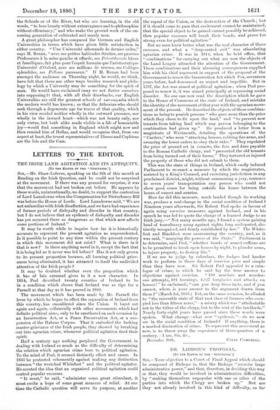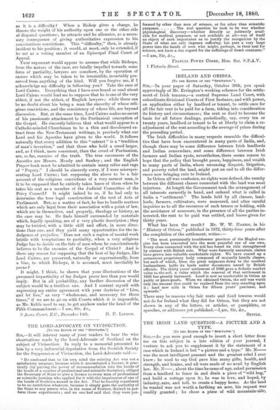DR. LIDDON'S PROPOSAL.
(TO THE EDITOR OF TI16 "SPECTATOR.-]
Stn,—Your objection to a Court of Final Appeal which should be composed of Bishops is, that the Bishops " exercise large administrative power," and that, therefore, in deciding this way or that, they would be involved in administrative difficulties, by " making themselves unpopular with one or other of the parties into which the Clergy are broken up." But are they not already involved in this kind of difficulty, so far
as it is a difficulty? When a Bishop gives a charge, he throws the weight of his authority upon one or the other side of disputed questions ; he attracts and he alienates, as a neces- sary consequence of giving authoritative expression to his conscientious convictions. This "difficulty," then, is already incident to his position ; it would, at most, only be extended, if he sat as a voting member of an Episcopal Final Court of Appeal.
Your argument would appear to assume that while Bishops, from the nature of the case, are fatally impelled towards some form of partiality, lawyers are somehow, by the operation of causes which may be taken to be irresistible, invariably pre- served from anything of the kind. Will you forgive me, if I acknowledge my difficulty in following you ? Take the case of Lord Cairns. Everything that I have ever heard or read about Lord Cairns would lead me to suppose that he is one of the very ablest, if not the ablest, of English lawyers ; while there can be no doubt about his being a man the sincerity of whose reli- gious convictions, and the consistency of whose life, are beyond discussion. But, at the same time, Lord Cairns makes no secret of his passionate attachment to the Puritanical conception of the Gospel. He sincerely believes that what would appear to a Catholic-minded Churchman to be a thin and discoloured ex- tract from the New-Testament writings, is precisely what our Lord and his Apostles have given to the world. It follows naturally that every addition to this " extract " is a "tradition of man's invention," and that those who hold a creed larger, and, as I think, more consistent, than the creed of Puritanism, are, so far, enemies of the truth. The true successors of the Apostles are Messrs. Moody and Sankey ; and the English Prayer-book must be admitted to contain many relics and rags of " Popery." I should be sincerely sorry, if I were misrepre- senting Lord Cairns ; but supposing the above to be a fair account of the religious convictions of a very earnest man, is it to be supposed that he entirely takes leave of them when he takes his seat as a member of the Judicial Committee of the Privy Council ? It might indeed be so, if he had only to determine the true legal construction of the text of Acts of Parliament. But, as a matter of fact, he has to handle matters which are only legal from their association with a point of law, which are in themselves, and properly, theology or history, as the case may be. He finds himself surrounded by materials which, legally speaking, are of a very plastic description ; they may be twisted, with a little skill and effort, in more direc- tions than one, and they yield many opportunities for the in- dulgence of prejudice. ' Does not such a region of mental work bristle with temptations to partiality, when a very religious Judge has to decide on the fate of men whom he conscientiously believes to be the enemies of the Gospel of Christ? And is there any reason for supposing that the best of lay Judges, like Lord Cairns, are preserved, naturally or supernaturally, from a bias, to which Bishops, it is assumed, must inevitably be prone ?
It might, I think, be shown that your illustrations of the presumed impartiality of lay Judges prove less than you would imply. But in all probability, any further discussion of the subject would be a fruitless one. And I content myself with expressing my entire agreement with your doctrine of " Live, and let live," as very " wholesome, and necessary for these times," if we are to go on with Courts which it is impossible, as Mr. Keble used to say, to get anyhow under the head of the Fifth Commandment.—I am, Sir, &c„ 3 Amen, Court, E.C., December 14th. H. P. LIDDON.







































 Previous page
Previous page